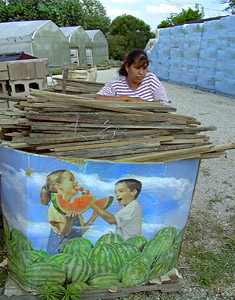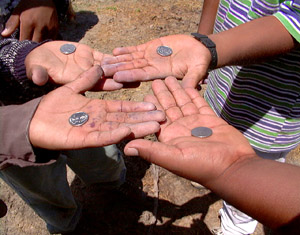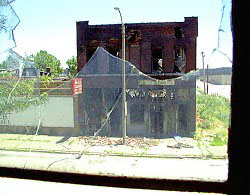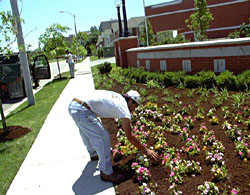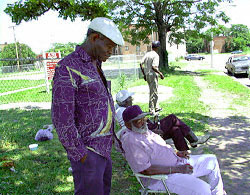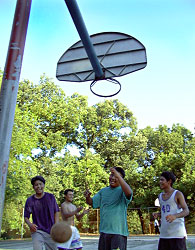|
|
ESPAÑOL |
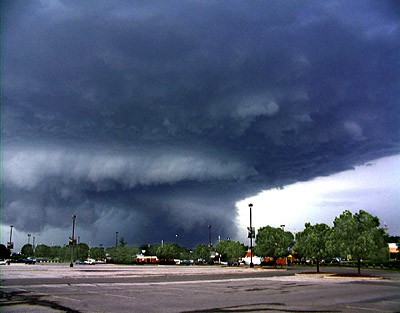
ST. LOUIS, MISSOURI.
Ever since watching The Wizard of Oz as a child, I've been fascinated with tornados. In the movie, the tornado is a kind of psychic vortex into which Judy Garland's Dorothy falls and experiences a "trip" to that place "somewhere over the rainbow," a region where everything oozes Technicolor, where characters and symbols appear with LSD-like twistedness and intensity–a dream state. The journey ends with the message: "There's no place like home." But of course Dorothy would never have realized the value of home had she not been picked up by the tornado and thrown into the Land of Oz. When I was a kid, Oz for me was Tijuana. A few times a year we'd pile into the family red Chevrolet station wagon and drive down the 5 freeway towards the border. I would always get a giddy feeling nearing the line. On the north side, there were bland tract homes, clean streets without potholes, no noise, no smells–somehow, it all felt black and white to me, like there was a law against color. Ah, but to cross over to the other side! The purple neons buzzing, announcing pharmacies and strip joints and bullfights! The blast of disco music on Avenida Revolución, the scent of trash fires burning, the anarchy of the traffic, the sheer loudness of it all! Tijuana was Technicolor. For this Mexican-Salvadoran kid born in America, Disneyland was south of the border. For the migrants, it is on this side. As tough as life might be for the travellers, it is still an adventure, a trip into an Oz-like dream state, where nothing is familiar, where everything's upside down. This has its good and bad sides, of course. While recently arrived Mexicans may marvel at the fun amenities of life in the north, they also chafe against the sheer orderliness of it all. How many times I've heard a migrant say, "They've got a law against having fun in this country." Meaning: you can't just have a party on the sidewalk whenever you feel like it. Over the past two days, the Tornado Warning siren at the Amoco gas station across the street from Crystal Gardens has gone off several times. On Friday, a massive black cloud hovered over the airport, forks of lightning madly darting down. At the same time, a funnel cloud was twisting down from the sky beyond the Gateway Arch in East St. Louis. Drenching rain and golfball-sized hail fell. My first real midwestern storm. The tornado of the global economy has picked the migrants up and delivered them to Oz. They have yet to find the Emerald City... which, in the movie, of course, is an illusion, a beautiful, scary lie... but they have found out something about themselves, and about their hosts, along the way. Unlike in the movie, however, "there's no place like home" is not their only guiding dictum. As we've seen, the pull of home battles with visions of the future, with the endless allure of the Emerald City, whether or not it actually exists. __________ If there is a heroine in this tale, it has to be Rosa Chávez. Baltazar might be the one who plays the role of teacher/guide for the family because of his talent for rapidly learning the ways of life in America, and Wense's newfound discipline for work and sense of responsibility provides another solid base, but it is Rosa who wields the greatest moral authority here. I first met the Chávez family a few weeks after the deaths of Benjamín, Jaime and Salvador. It was a Sunday, everyone was dressed for church. Rosa's brothers Florentino and Fernando were there, and their wives and kids, and Rosa's mother, María Elena, and the wives and kids of the deceased. But no one spoke to me except Rosa. And she spoke clearly, powerfully, in soundbites with succinct talking points, about the meaning of the tragedy and the family's quest for justice in the case (they have sued the United States Government for recklessly and needlessly placing the brothers in mortal danger). About the reasons why so many people leave Cherán and try their luck in the north. About the absurdity of how lacking a silly piece of paper and plastic–a green card–was, in the end, what had killed her brothers. Rosa is like many migrant women that I know. Like Reyna Guzmán, she is both tender and feisty... she doesn't take shit from anyone. When Wense falls off the wagon, she lets him know her displeasure. She strikes me as a woman who is well aware that she might one day have to go it alone as a mother–and she's ready for that possibility. She does not assume the stereotypical passive role of the Mexican woman. She doesn't like cooking; in fact, Wense and his brothers spend quite a bit of time in the kitchen preparing meals and sharing in dishwashing duties. On the farm, she has driven a tractor. She has driven the family car. In Cherán, the constraints of the downside of la tradición would have prevented her from doing any of these things without raising eyebrows and howls of macho disapproval. There was a time when migration offered the men of Cherán carte blanche to have their "on the road" adventure, men acting like boys and boys acting like men, working hard and partying hard, a girlfriend in the north and the wife and kids back home... Times have changed. Baltazar tells me that Charly, the town coyote, is extra-careful these days when he is approached by women in Cherán. More than once they've told him that their husbands had the money waiting for him in the U.S., but that wasn't the case. The women had been told by their husbands to stay home... and back home the women heard rumors of infidelity and carousal... and so, without telling their husbands, they'd go to Charly... and they'd just show up, in L.A. or St. Louis, in Arkansas or Wisconsin, at the doorstep of their husbands' trailer or apartment or house, to the surprise and chagrin of the husbands, and of Charly, because the men often didn't have the money to pay off the debt. And thus the women of Cherán have been demanding responsibility from their men–and, quite often, getting it. _________ Under the sweating sky. In the fields they plow the earth. In the fields they sow the earth. In the fields they spray the pesticides. In the fields they bury irrigation hoses. In the fields they prune the tomato plants. In the fields the pale skin of their fingers turns pink from the raspberries picked. In the fields they look up at the TWA jet cutting through sweating cloud. In the fields they mop their brows with their forearms. In the fields they nod their heads at the patron. In the fields it is now lunchtime and they walk through the peach grove and through a hole in the fence and across the parking lot and around the building and up the stairs where someone just smoked a joint and they turn on the TV and sponge up the mole and with their tortillas never using forks or knives and they lay on the couches in the living room for twenty minutes and then back out, back through the hole in the fence out into the fields. In the fields daffodils float. In the fields at night fireflies appear and disappear. In the fields they remember Michoacán by playing music on a tattered casette box. In the fields Rosa remembers her brothers. In the fields Rosa can see Yeni peering through the window of the old house where Victor Izquierdo's wife does the day-care. In the fields Wense is getting bored. In the fields Baltazar is thinking of a new job. In the fields it is break time, which is not really a break, just a couple of minutes to drink a Coke or a Cherry Coke or a Diet Coke, and whose turn is it to go to the vending machine? In the fields the brothers toss the coins. In the fields the coins float and turn and glitter under the sweating sun. In the fields each brother slaps one hand down upon the other to hide the coin and they say "1-2-3!" together and their hands come up and on the palms there appear silver heads and tails and they laugh and it is Gaspar's turn to go. _________ While Rosa and Wense debate whether to stay or to return home, Balta appears resolved to make a go of it in the U.S. The last time he crossed the border–that time that Gaspar almost drowned–made him rethink his constant commuting between Cherán and St. Louis. "It's getting so difficult to cross... " Balta says. He has opted to stay on this side of the border. After all, his daughter Stefani is an American citizen. Hers is the future. He sits in the living room, relaxing after work. HBO is on. Balta is in shorts and sandals and his perennial Chicago White Sox baseball cap. He's just taken a shower. He sits in the chair under an image of two children, boy and girl hand in hand crossing a broken-down wood bridge spanning a raging river, at night, in a terrible storm, a winged angel looking down on them from the rolling heavens. It is a puzzle that the family put together and glued to a piece of cardboard. It is the centerpiece of the living room. Balta says he'll probably stay in the States three years without returning home. It'll be his longest stay. If it were up to Balta, he'd continue the commuting. But for the migrants, for whom crossing the border used to be as easy as climbing a fence, the commute isn't like a businessman catching a shuttle flight. The angel of the border doesn't always appear when you need her the most. _________ The economy is booming! Across America, the stock analysts and investment bankers and others who are paid well to masturbate the numbers tell us that it is so. And there is undeniable evidence–lower unemployment, lower inflation, lower crime–that this is so. What no one talks about is that part of the economy has yet to resurrect from the death of de-industrialization. There is 4.3 per cent unemployment right now. It is more than double that figure among young African Americans. Joe and I take the rental car and drive across St. Louis on St. Charles Rock Road, a major east-west artery. We just want to get a sense of the place. Nearing downtown, St. Charles Rock becomes Martin Luther King Boulevard. We see block after block of burned-out and boarded-up buildings, like a battle had been fought here years ago, house to house. Never in my life have I seen such urban destruction–except in the Mt. Pleasant neighborhood of Washington, D.C., or in photographs of the South Bronx in the 1980s. This is downtown St. Louis, only a few blocks away from the business district where men in suits and women in dresses and sneakers rush about with Starbuck's lattés-to-go. The Gateway Arch crowns the devastation. We drive along Cass Avenue and suddenly come upon a new housing development, a shining symbol of what will happen, what is happening to such neighborhoods across the country–redevelopment that will drive the poor out of downtown. Middle-class whites and blacks are moving in. It is Saturday and a landscaping crew is putting the finishing touches on the complex, a carefully, beautifully rendered tableau of geraniums, lawn grass, young trees. The landscaping crew is Mexican, of course. ______ Further down Cass Avenue, at the intersection of Grand, we notice a group of elderly African American men sitting in chairs on the sidewalk under the shade of a large tree. I wonder aloud to Joe whether we should stop and chat. It is one of those classic moments of indecision while doing documentary work–spontaneity can work for you or against you. Sometimes, in a neighborhood where you don't know anybody, or anything about its history, you are seen as an outsider to be distrusted and nothing you can do will gain that trust–sometimes, trouble starts. But other times, everything falls into place within a matter of seconds and suddenly the neighborhood and its meaning come to life before your very eyes, through the generosity of people who seconds ago were strangers. And so it is with the elders of Near North St. Louis, retirees who gather under the "shade tree," as they call it, day in and day out, watching the neighborhood change before their very eyes, mourning what was, dreading what will be. Leo Williams, 60, a native of Pine Bluff, Arkansas who was raised in St. Louis, tells the tale of deindustrialization. He worked the fisheries on the Mississippi, he worked at the American Car Foundry, he worked construction... companies that are all gone. His friend Melvin Duane, 59, worked at a meat-packing plant that moved out "oh, I forgot how many years ago now... " "We used to have everything here–shoe factories, all kinds of steel foundries, electric companies, pickling companies with big old vats of vinegar, clothing companies... most of them was union jobs... " And in the neighborhood there were "mom and pop" stores, and ice cream parlors, and shoe repair shops, and recreation centers.... But to grow up in near North St. Louis these days... young man these days, the elders say, can't do much more than get a fast food job. "It's going all technology, you know, computers," Duane continues. "All kind of high-tech. And if young black men don't get an education, black people, period, there won't be no jobs for them." We ask about the burned-out buildings. Arson, we are told. Property owners torching their own buildings to get insurance money. Or the homeless building fires to keep warm in the winter. Or careless crack addicts. "You see, it's all planned out," Leo says. The landlords stop upkeep on the buildings, government services pull out, the property values become depressed, paving the way for developers to come in and buy the land at rock-bottom prices, and then the new buildings go up, where rents will be jacked sky-high... And then the conversation turns to the immigrants... "The A-rabs, they're the ones that are takin' over," says Roosevelt Moore, another elder. "And down in Mississippi, they have a lot of Mexicans that they don't have to pay no tax and they don't do nothing but make their money and put it in they pocket. But you a black man they going to take out the tax and everything else... " Optimism comes hard from the perspective of the black elders of near North St. Louis, a sharp contrast with the perspective of the migrants. But in the end, the Mexicans and the blacks share the same space here–and quite possibly the same future. I keep thinking about Leo's comment on technology and education. Neither African American or Mexican in the inner cities are getting the education needed to succeed in the information economy. "St. louis ain't got nothing going for it," Leo says. " If you got something going for you talent-wise you got to leave... if you a singer, boxer, dancer, or blowin' or beatin' a drum you can start here but ain't nothing going on here... " "At five o' clock in the evening one of the biggest cities in the United States is DEAD... From the county they come down and work in the day and pppphhhht! After that it's the fuckin city shut down... " Leo says he should have left St. Louis long ago. But he got married, and had children–children that have done well by themselves, actually, and he just never had a chance to move. "I really do regret not leaving this city when I was a young man. I should have gave it a shot on one of those coasts. I should have left this town... it's still just a town." Under the shade tree, the elders grow quiet. _________ The Chávez-Cortéz family insists on taking us out to dinner. To a Mexican restaurant, of course. Las Palmas, it's called, and it is a clean, well-lit place that serves migrants and Mexican-food-loving gringos alike. We are serenaded by a duet that plays songs from the Old Country, like "Qué lindo es Michoacán," ("How Pretty Michoacán Is") which Wense asks for. When it comes my turn, I request "Volver, volver" (Return, Return), which is a kind of anthem for migrants, whether they left Mexico six months or three generations ago: "Y volver, volver, volver a tus brazos otra vez llegaré hasta donde estés yo se perder, yo se perder quiero volver, volver, volver" (To return, return, return/ to your arms once again/ I'll go as far as it takes/ I can swallow my pride/ I want to return, return return) When migrants sing this song, the lost love they sing about is more than an ex-girlfriend or boyfriend. It is their mother back home, their extended family, their friends, the stroll around the plaza in the early evening, the fiesta; the object of desire is home. Wense and Rosa are very talkative at the table, reminiscing about Cherán, but Balta is reserved, almost morose. Earlier in the evening, he'd told me about flirtations he's had with gringas, encounters that never amounted to much. His wife Victoria will be leaving Michoacán with Charly the coyote any day now. For Balta, she can't get here soon enough. _________ Sunday afternoon. As in Watsonville last week, as in every place in America where the migrants live and work, there is lounging about, and beer, and TV, and changing the spark plugs on your car while drinking beer and chatting with friends... The Cortéz brothers are playing basketball in a nearby park directly underneath the flight path of jets on final approach for landing at Lambert International, the roar of the engines overwhelming their grunts and shouts and the slap of the ball on the apshalt court.
The people of Cherán love basketball, even over soccer. Perhaps it is because basketball is the one sport that approximates the rhythm of their lives: fast, as in fast-break, as in steal the ball and run clear across the court for the slam-dunk, as in that one moment–just a moment, a split-second–when you lose the defender and the shot is clear and you jump and the ball arcs and it's nothin' but net. We return home in time to watch the final moments of the Bulls-Jazz game. Michael Jordan slaps the ball away from Karl Malone. He breaks away. He jumps. Nothin' but net. The Cortéz brothers are overjoyed. They'll be Bulls fans to the end. Did I mention that the wood for the Chicago Bulls' court was cut by a crew of Cherán guys working the saw mills of Arkansas? _________
JUNE 15 NEWS FLASH: "The New Americans" project at ZoneZero is suspended until further notice. Joe has come down with a very bad case of stomach flu, and his doctor is beseeching him to return home and rest. It is actually quite amazing that he's gone this far. He has not been at his physical best since the beginning of this trip, but he has gone into the field every single day and done his best. At least we made it half way. At least we saw the Mississippi River. Next time we go out on the road–Joe will take time off to recover, Rubén will finish his book, and then we'll regroup to complete the journey–we promise to cross it. It has been a grueling, gratifying experience, this exploration of virtual and real space. There've been hits and misses, as befits any experiment, but overall we're very proud to be part of this project. We'd like to thank Pedro Meyer, Trisha Ziff, and their crew in Mexico City: Julie Donadiue, José Antonio Alcántara, Lalo Greiner y José Luis Bravo, for their countless hours of technical and design support. Also, Joe and I would like to thank Sandy Close, the executive editor at Pacific News Service, who has supported our work on migration for many years — without her, this project would never have been realized. But most of all, we would like to thank the families that allowed us into their lives so that we might better understand the nature of the road that all of us, in one way or another, are travelling. Soon... we'll all meet again on the road. Hasta entonces... ____________
|
|
